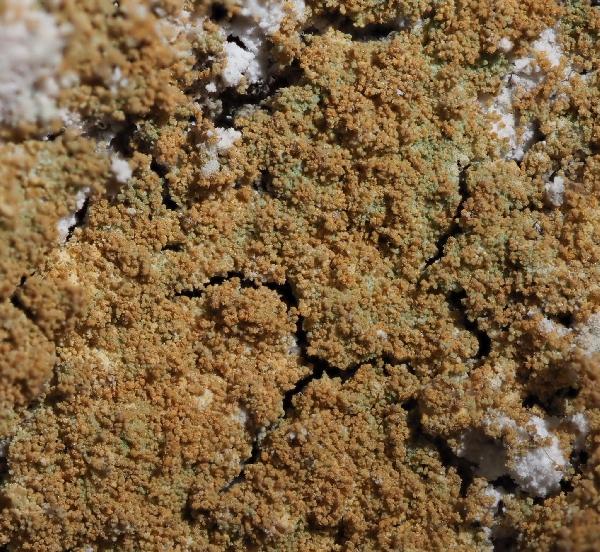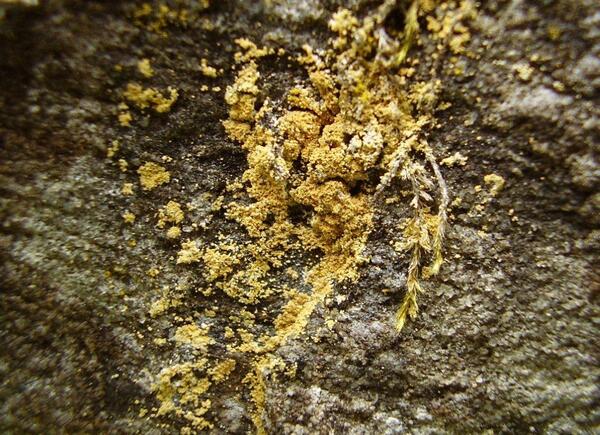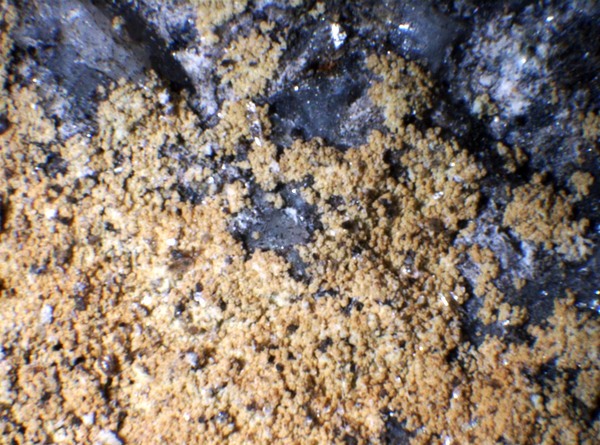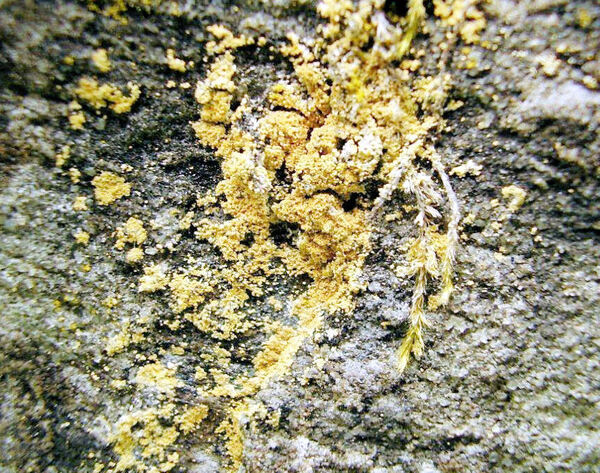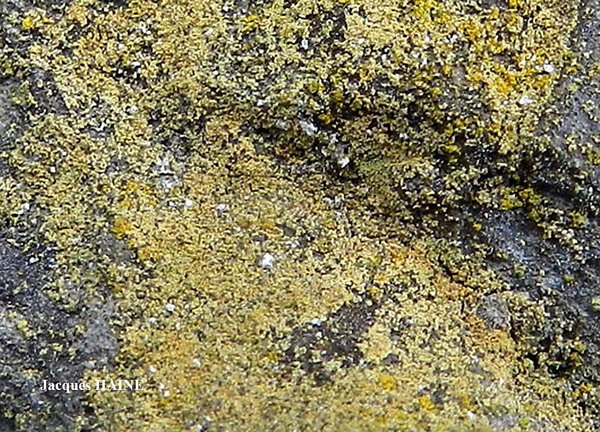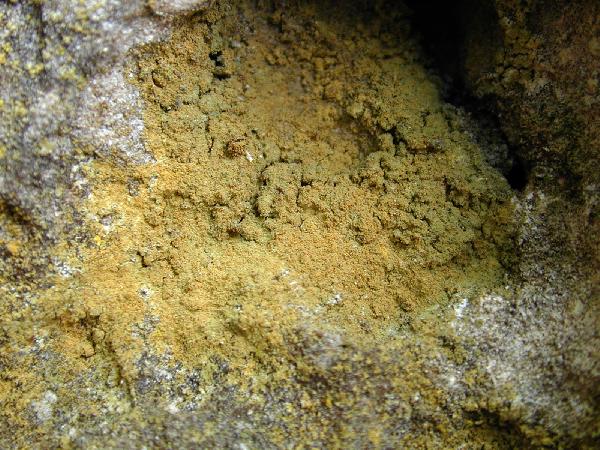Leproplaca chrysodeta (Vain.) Ahti
J.R. Laundon ex Ahti in Ahti & al., Graphis Scripta, 27: 39, 2015. Basionym: Placodium chrysodetum Vain. - Meddeland. Soc. Fauna Fl. Fenn., 47: 18, 1921.
Synonyms: Callopisma chrysodetum (Vain.) Räsänen; Caloplaca chrysodeta (Vain.) Dombr. comb. inval.
Distribution: N - VG (Tretiach 1997), Frl, Ven (Caniglia & al. 1999, Nascimbene & Caniglia 2000, Nascimbene & Marini 2007, Nascimbene 2008c), Lomb (Gheza & al. 2023), Piem (TSB 35311), Emil (Nimis & al. 1996, Fariselli & al. 2020), Lig (Brunialti & al. 1999, Valcuvia & al. 2000, Giordani & al. 2025). C - Tosc (Tretiach & al. 2008), Marc (Nimis & Tretiach 1999), Umb (Genovesi & Ravera 2001, Ravera & al. 2006), Laz (Nimis & Tretiach 2004), Mol (Ravera & Genovesi 2010, Ravera & al. 2009, Genovesi & Ravera 2014), Sar (ASU-511124). S - Camp (Nimis & Tretiach 2004, Garofalo & al. 2010), Pugl (Nimis & Tretiach 1999), Cal (Puntillo 1996), Si (Ottonello & Salone 1994).
Description: Thallus leprose, episubstratic, brownish orange to yellow-orange with an ochraceous tinge, entirely consisting of scattered to contiguous, 50-100 µm thick, soredia-like, globose granules forming an up to 0.8 mm thick, poorly delimited, marginally not lobed crust. Apothecia and pycnidia not known. Photobiont chlorococcoid. Spot tests: thallus K+ purple red, C-, KC-, P-, UV+ orange. Chemistry: thallus with parietin (major), fallacinal, emodin, teloschistin and parietinic acid (minor), corresponding with chemosyndrome A of Søchting (1997).Note: a temperate to humid subtropical species found on shaded, steeply inclined or rain-sheltered surfaces of calciferous rocks, sometimes also overgrowing epilithic mosses or even occurring on the undersides of inclined old trunks of trees with base-rich bark; certainly ranging throughout the country, below the subalpine belt.
Growth form: Leprose
Substrata: rocks
Photobiont: green algae other than Trentepohlia
Reproductive strategy: mainly asexual, by soredia, or soredia-like structures (e.g. blastidia)
In underhangs rarely wetted by rain
Commonnes-rarity: (info)
Alpine belt: absent
Subalpine belt: rare
Oromediterranean belt: absent
Montane belt: rare
Submediterranean belt: rare
Padanian area: absent
Humid submediterranean belt: rather rare
Humid mediterranean belt: rare
Dry mediterranean belt: absent

Predictive model
Herbarium samples
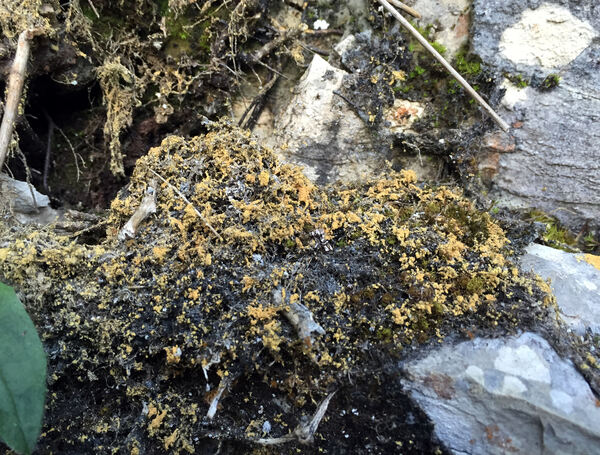

P.L. Nimis; Owner: Department of Life Sciences, University of Trieste
Italy, Friuli Venezia Giulia, Udine, Lago di Sauris, Bosco Flobia, Ampezzo Carnico, 1000 m
09.09.2016
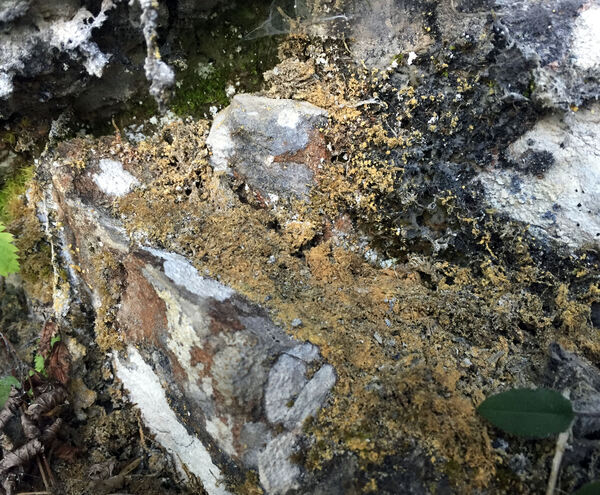

P.L. Nimis; Owner: Department of Life Sciences, University of Trieste
Italy, Friuli Venezia Giulia, Udine, Lago di Sauris, Bosco Flobia, Ampezzo Carnico, 1000 m
09.09.2016
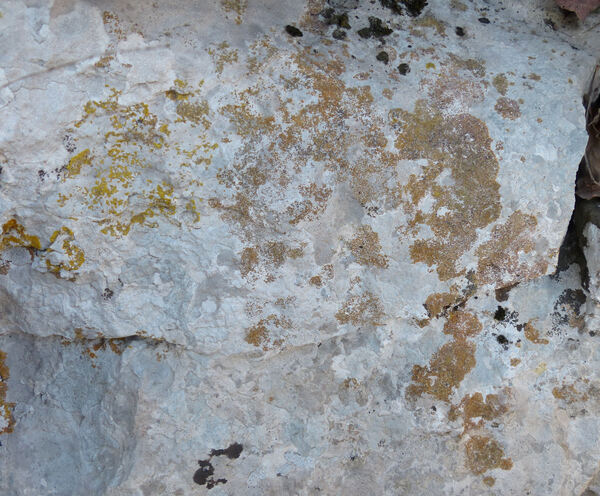

Andrea Moro; Owner: Department of Life Sciences, University of Trieste
italy, Friuli Venezia Giulia, Trieste, Trieste Karst near Borgo Grotta Gigante
16/02/2017
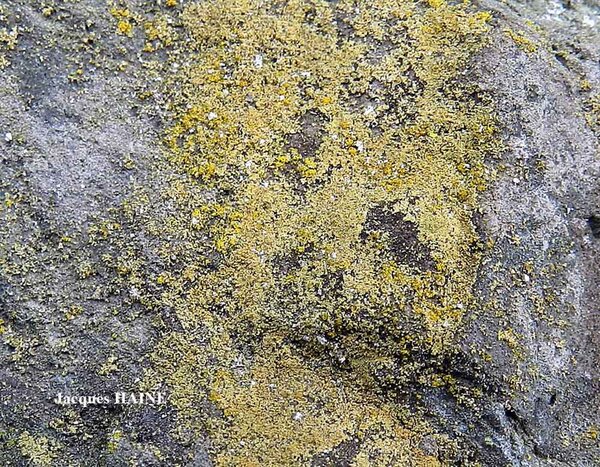
Jacques Haine - Source: http://www.lichensmaritimes.org/index.php?task=fiche&lichen=672&lang=en
France, Han
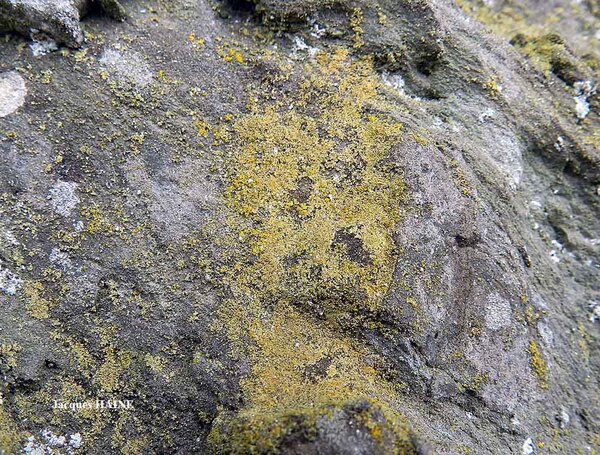
Jacques Haine - Source: http://www.lichensmaritimes.org/index.php?task=fiche&lichen=672&lang=en
France, Han
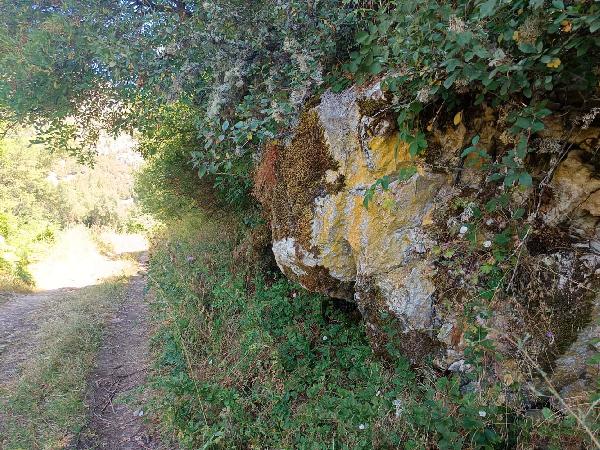
Marta González Garcia - Centro de Estudios Micologicos Asturianos
Spain, Valdoré (Léon), 23-VII-2024, sobre rocas calizas.
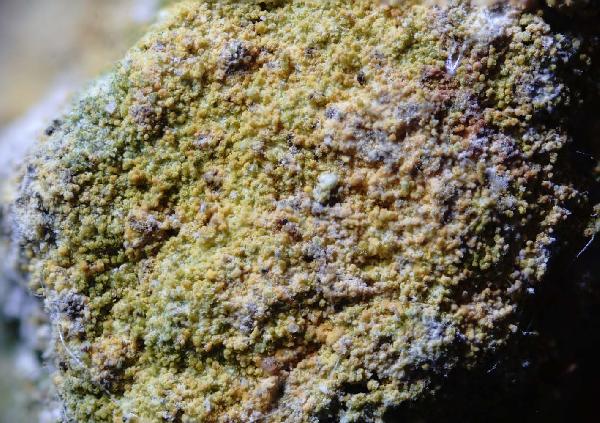
Marta González Garcia - Centro de Estudios Micologicos Asturianos
Spain, Valdoré (Léon), 23-VII-2024, sobre rocas calizas.
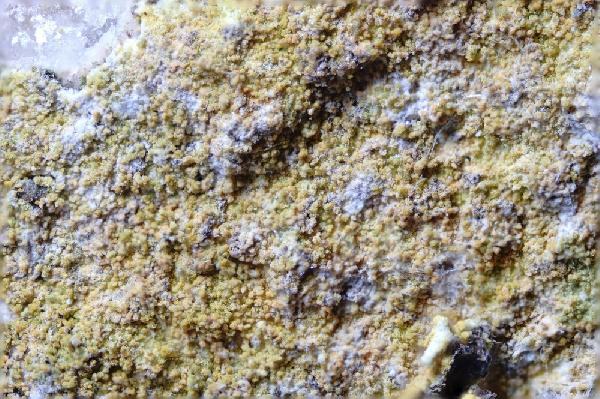
Marta González Garcia - Centro de Estudios Micologicos Asturianos
Spain, Valdoré (Léon), 23-VII-2024, sobre rocas calizas.
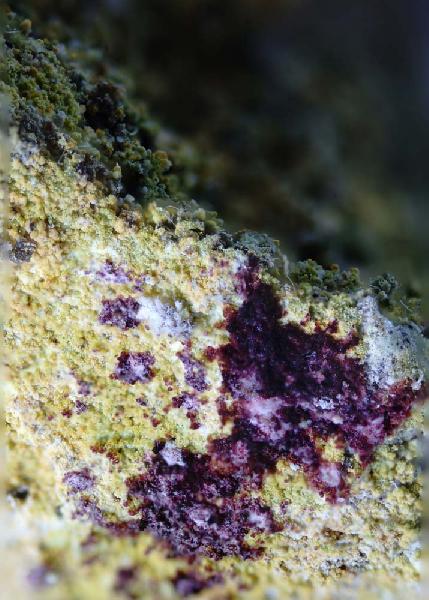
Marta González Garcia - Centro de Estudios Micologicos Asturianos
Spain, Valdoré (Léon), 23-VII-2024, sobre rocas calizas.

Marta González Garcia - Centro de Estudios Micologicos Asturianos
Spain, Valdoré (Léon), 23-VII-2024, sobre rocas calizas.
Growth form: Leprose
Substrata: rocks
Photobiont: green algae other than Trentepohlia
Reproductive strategy: mainly asexual, by soredia, or soredia-like structures (e.g. blastidia)
In underhangs rarely wetted by rain
Commonnes-rarity: (info)
Alpine belt: absent
Subalpine belt: rare
Oromediterranean belt: absent
Montane belt: rare
Submediterranean belt: rare
Padanian area: absent
Humid submediterranean belt: rather rare
Humid mediterranean belt: rare
Dry mediterranean belt: absent

Predictive model
| Herbarium samples |


P.L. Nimis; Owner: Department of Life Sciences, University of Trieste
Italy, Friuli Venezia Giulia, Udine, Lago di Sauris, Bosco Flobia, Ampezzo Carnico, 1000 m
09.09.2016


P.L. Nimis; Owner: Department of Life Sciences, University of Trieste
Italy, Friuli Venezia Giulia, Udine, Lago di Sauris, Bosco Flobia, Ampezzo Carnico, 1000 m
09.09.2016


Andrea Moro; Owner: Department of Life Sciences, University of Trieste
italy, Friuli Venezia Giulia, Trieste, Trieste Karst near Borgo Grotta Gigante
16/02/2017

Jacques Haine - Source: http://www.lichensmaritimes.org/index.php?task=fiche&lichen=672&lang=en
France, Han

Jacques Haine - Source: http://www.lichensmaritimes.org/index.php?task=fiche&lichen=672&lang=en
France, Han

Marta González Garcia - Centro de Estudios Micologicos Asturianos
Spain, Valdoré (Léon), 23-VII-2024, sobre rocas calizas.

Marta González Garcia - Centro de Estudios Micologicos Asturianos
Spain, Valdoré (Léon), 23-VII-2024, sobre rocas calizas.

Marta González Garcia - Centro de Estudios Micologicos Asturianos
Spain, Valdoré (Léon), 23-VII-2024, sobre rocas calizas.

Marta González Garcia - Centro de Estudios Micologicos Asturianos
Spain, Valdoré (Léon), 23-VII-2024, sobre rocas calizas.

 DOLICHENS
DOLICHENS
